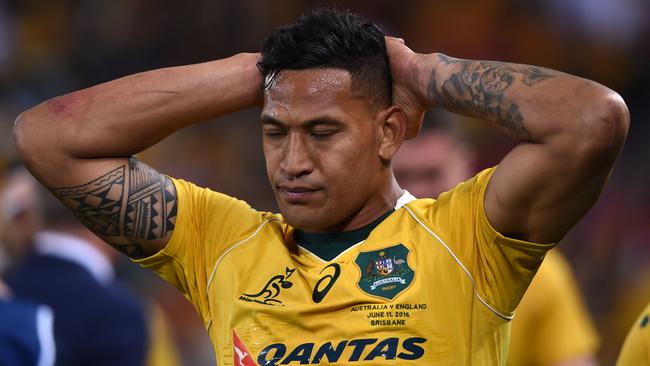Rugby Australia poised to rip up Israel Folau’s contract
Australia’s one truly world-class rugby player, Israel Folau, will likely have his $4m contract ripped up.

Australia’s highest-profile rugby player, Israel Folau, has been tried in absentia and it is now almost certain he will have his $4 million contract ripped up in the year of a World Cup.
Folau has been uncontactable since he posted disrespectful and offensive material online on Wednesday night, leaving Rugby Australia’s Integrity Unit to conduct its investigation into his behaviour in his absence yesterday.
But his words of warning that “drunks, homosexuals, adulterers, liars and fornicators” are headed to Hell unless they repent were crystal clear.
“Those that are living in sin will end up in Hell unless you repent. Jesus Christ loves you and is giving you time to turn away from your sin and come to him,” his post said.
In a joint statement released by RA chief executive Raelene Castle and NSW Rugby Union CEO Andrew Hore last night, it was made clear that Folau has been told “formally and repeatedly” that any social media posts or commentary that was in any way disrespectful to people because of their sexuality would result in disciplinary action.
“In the absence of compelling mitigating factors, it is our intention to terminate his contract,” the statement read.
Folau’s 73-Test career for the Wallabies appears over, although it is unlikely that the RA punishment will prevent him from playing rugby in France, Britain or Japan, or indeed from resuming his rugby league career with an NRL club — with Peter Beattie slamming that door shut.
On the back of the developments, Australia’s odds to win the World Cup in Japan later this year have slipped from 12-1 to 15-1.
It is sadly incongruous that a player widely acknowledged as a tremendous ambassador for the game, one who gives freely of his time to charitable causes, should come to such an ignoble end for essentially quoting from the Bible, when so many other players who have brought the game into disrepute are allowed to continue in rugby. In essence, however, he has paid the price for disrespecting the many warnings he had been given.
The Rugby Union Players Association insisted it did not endorse or condone the contents of Folau’s social media post but it said it was imperative that the proper processes were followed under the code of conduct.
“We will continue to work with Israel, his representatives, the NSW Waratahs and RA to ensure this occurs,” it said in a statement.
While many might argue that 30-year-old Folau’s rights to free speech and religious freedom have been trampled on, in the end his situation came down to a simple breach of his employment contract.
In return for the sum of $4m over four years, he was obliged not to criticise the values of his employer, not to share material on social media that condemned, vilified or discriminated against people on the basis of their sexuality. He failed to do that and it is difficult to imagine any Qantas or BHP employee remaining in their job had they posted anything similar to Folau’s warning.
Certainly there is anecdotal evidence that his comments last year drove some in the LGBTI community to contemplate suicide. Repeating them a year later, indeed expanding upon them, was seen as an inexcusable breach of common decency.
Dual World Cup-winner Tim Horan last night spoke for the code in Australia when he lamented the likely termination of Folau’s career.
“So many kids just want to see him play,” said Horan. “He has been a fantastic rugby player but it’s sad and selfish of him to have let his teammates down in a World Cup year.”
It is understood that in the days just before Folau’s controversial reappearance on social media, Rugby Australia had begun to negotiate with Qantas over the extension of its multimillion-dollar naming rights sponsorship. There can be little doubt that this weighed heavily on how seriously Rugby Australia saw his breach.
It remains to be seen how the treatment of Folau, who was born in the south-western Sydney suburb of Minto of Tongan parents, impacts on the deeply religious Polynesian community that currently supplies 46 per cent of Australia’s professional rugby players.
There is no question the role of Castle in Folau’s sacking will be minutely dissected.
Barely four months into her new role as Rugby Australia chief executive last year, she was thrust into the tricky situation of steering the code through a maze of conflict, protecting Folau’s rights while at the same time recognising the sensibilities of all the many groups he had offended, sponsors included.
In the end, she took the decision not to sanction him, which seemingly was the correct call. But such an exemption could only be granted the once. She sought formal assurances from him that any social media posts would be non-offensive and welcomed Folau’s promise he would abide by that. He didn’t.



To join the conversation, please log in. Don't have an account? Register
Join the conversation, you are commenting as Logout